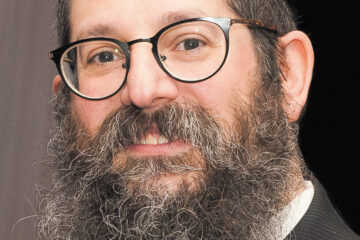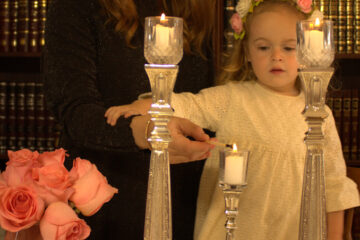The gift of Torah
By Rabbi Nochum Mangel, Chabad of Dayton
We have just celebrated Simchat Torah. Synagogues were filled with singing and dancing, parades and happiness, celebrating the gift of Torah.
But what do we mean by Torah and why do we celebrate it?

We use the word Torah in different ways.
Sometimes, we mean the scrolls that we have in the synagogue or the text those scrolls contain: the Five Books of Moses.
Sometimes we refer to all of what the rabbis of the Talmud call the Written Torah, the Tanach, including the Prophets and the Writings.
But the root meaning of Torah is “instruction” — and so sometimes when we use the word ‘Torah’ we mean the sum of all of Jewish teaching throughout the ages.
We consider the whole of the teachings of our people, throughout every age, who turned to God for instruction in life.
We use our minds to understand, to grasp the context and the parameters of the teachings, and to gain insight into how God’s wisdom can be applied to the decisions that face us in our lives, here and now.
It is in this all-inclusive meaning that we can really see Torah as a gift.
An early Midrash tells us that in the beginning, God first looked into the Torah and only then created the world. Implicit in this is that the Torah is the blueprint for creation and addresses every aspect of existence and that it is a resource for any and all decisions in our life.
It is a long way from a few words engraved on stone or a few books written on parchment to a universal guide to all of life.
So, our tradition tells us, God not only gave us a text but taught us its context. This is what we call the Oral Torah, and it is an integral part of the gift.
Some time ago, a reporter was interviewing Elie Wiesel in his home. The reporter was amazed at the large library there, and asked Wiesel about the various books that he saw.
Wiesel pointed to one part of his shelf and told him that there was the Bible. What’s next to it? the reporter asked. Wiesel answered that it was the Mishna, a commentary on the Bible set down centuries later.
The reporter asked about the set of books next to that. That, explained Wiesel, is the Gemara, which is a commentary on the Mishna, a few centuries later. Next to that is Maimonides’ code, a few centuries later than that, summarizing the material in the Gemara.
“Ah, I see,” said the reporter. “It’s all an ongoing dialogue crossing the centuries.”
The teachings of the Torah are not meant to be buzzwords, ripped from context. When we join the Torah’s dialogue, we see how the words given to Moses are analyzed and take form in the Talmud, and become defined in the law codes.
Then, in the responsa literature, we see how they were actually applied in real life by actual people looking for guidance.
In the responsa literature, we see how the word of God actually becomes a life-choice in the real world. The whole of Torah was engaged in answering the questions that people brought to the rabbis, seeking God’s wisdom; no slogan or pet phrase could ever do the job.
This dialogue of Torah is marked by the sincerity of the quest, by the respect for truth, and by a humility and a daring that go hand in hand.
Humility — in that the condition of entrance to this discussion is the recognition that we have a need to learn and that we do not ourselves possess the entire truth.
Daring — in that within this dialogue, we are empowered to connect God’s ultimate truth to everything we do.
Knowing that we have such a resource challenges us. How can we make important decisions without using its wisdom?
Ignorance has not been a Jewish value. A modern Israeli scholar, Rabbi Adin Steinsaltz, relates that his father, who was a committed socialist, nonetheless sent his son to study Torah, saying, “I don’t care if you become an atheist, but I never want you to be an ignoramus!”
The gift of Torah is that it shows us a way in which we need not be slaves to our own biases, to our own distinctive personality traits, or to our habits of thought. It is a gift that challenges us to give all we have, never to rest content with pat phrases, party lines, talking points, conventional wisdom.
What the Torah seeks in its conversations is not the triumph of one point of view over another, but the deepening of all points of view so that all can see the source of all truth.
That dialogue has never stopped. Istakel batorah uvara alma — as God looked into the Torah to create the world, may we, created in God’s image, also look to the Torah as we use our human creative power in this world.
God has given us powers of thought, speech and action that we use to change and create; God has then given us the owner’s manual for how to use those powers.
Let us look into the Torah, challenge ourselves to transcend our old habits, however comfortable they may be, and engage in a true dialogue with our fellows and with God.
The result will be what was first envisioned in the Torah portion of Bereshit, the very beginning of the Torah, that we have just read, a world that God calls “very good.”





